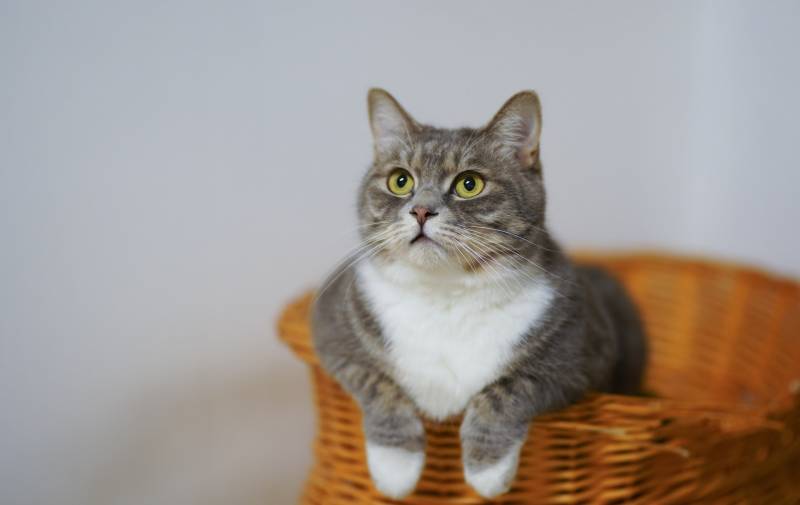Quick Navigation
If you’ve been asking, “Why does my cat nurse on me,” this article is for you.
Because it is typical yet strange behavior in cats to nurse or suckle on objects or their owner’s arms/hands.
This behavior is not exclusive to kittens, as fully-grown cats may do the same.
Although it can feel strange, it is not a cause for alarm.

This behavior has a simple reason and can be easily managed if appropriately handled with care.
First, let’s answer the big question.
Why Do Cats Suckle Or Nurse On People Or Objects?
Some kittens prefer kneading on and chewing a fabric or a favorite toy.
Some prefer to use their owners’ clothes or bite their hands or arms during play.
No matter the choice, the reason behind this behavior remains the same.
Suckling and nursing behavior is most common in cats separated from their mother soon after birth.
As the kittens don’t get enough time with their mother, a crucial component of their maturation is left out.
It leads to the suckling and nursing behavior you see today.
A Natural Transition
To understand why this happens, we must know how a mother cat handles kittens as they grow.
For the first 4 to 6 weeks after birth, kittens feed their mothers’ milk by nursing and suckling.
A kitten usually kneads the mother’s underbelly to get the milk flowing.
This pattern of suckling, kneading, and nursing is an instinct that lets kittens feed properly.
As kittens grow, the mother transitions them from a milk-based diet to solid food step-by-step.
This stage of their growth is called “weaning.”
When the mother cat begins weaning the kittens, she reduces the frequency of their suckling.
This helps kittens take to solid food.
After a few weeks, the suckling and nursing behavior is eliminated.
The kittens then start feeding primarily on solid food.
An Interrupted Process
When kittens are separated early from their mother after birth, this weaning process is incomplete.
This leads to the suckling and nursing behavior you see with your cat or kitten.
Because the kitten never learned to stop this behavior, they think it is normal.
Play And Peace
The behavior is most common when the cat or kitten is in a playful or relaxed state.
A kitten or grown cat that still exhibits nursing behavior usually uses it to show affection.
It is because this behavior is typically directed at the mother.
But because the kitten was separated early, this behavior becomes imprinted onto the owner, meaning you.
Expression Of Love
Your feline friend now sees you as their mother.
You are its source of comfort and warmth.
Naturally, it would like to express its affection to you.
If you find your cat suckling on you, it adores you.
This may even be accompanied by gentle kneading.
Your presence gives them a sense of safety.
It is also a way for the cat to express its contentment.
So, rest assured, your fur baby is happy and wants to show it.

Could This Behavior Harm My Cat In Any Way?
Suckling and nursing are completely harmless acts.
They do not bring any harm to the cat or even you.
Therefore, this behavior is not a cause for concern and does not warrant a visit to the vet.
Is There A Way To Stop My Kitten From Nursing On Me?
The answer is yes!
It is relatively easy to stop your cat or kitten from nursing inappropriately on you by giving it time and patience.
Rushing this process or using rigorous methods can strain your relationship with them.
To reduce and eliminate this behavior, you must recreate the weaning process the kitten missed during its early growth.
Doing so, you help the cat slowly transition from this behavior just like they would typically with their mother.
Step 1: Transition
The first step is to help the cat or kitten transfer their actions from you to something else. You will need to teach your cat or kitten to stop nursing on you and use something else instead.
To do this, you can use toys, a piece of cloth, or other soft objects like a pillow. Use something that cannot be easily torn, doesn’t have removable pieces like buttons, and is made with non-toxic materials.
If it’s a blanket, make sure the fabric does not pill. Remove any loose threads that could potentially be swallowed.
First, rub the intended object on your arms or clothes to get your “scent” onto the object.
Then, whenever your cat starts nursing you, interrupt their behavior and give them the object to nurse instead.
It won’t be easy or quick. But with patience, you can get the cat to transition onto the object.
Step 2: Reduction
Good work if you have successfully transitioned your cat to nursing their favorite toy or blanket instead of you! The next step is to reduce this behavior as much as possible.
It means gradually discouraging your cat from nursing, suckling, or kneading on anything at all.
You can do this by using food or toys to distract the kitten when it begins nursing on the object.
Interrupting this behavior and providing an alternative makes your cat gradually become less attached to the nursing action.
It is called positive and negative reinforcement, which means that whichever behavior is rewarded gets repeated.
You can provide enough positive reinforcement to reduce this behavior altogether by rewarding alternative actions and interrupting their nursing behaviors.
Step 3: Elimination
The last step is to eliminate this behavior.
Once again, it would be best to do so gradually and with patience.
Remember that kneading is an instinct most cats perform when they wish to get comfortable.
The action also helps them clean their paws and nails as a regular hygiene-related activity.
An excellent solution is to provide a safe place for them to do this, like a cat tree.
On the other hand, you should slowly reduce the cat’s exposure to the object previously used for the transition to discourage and eliminate nursing behavior.
It means taking it away when the cat begins nursing, making it inaccessible, and hiding the object.
Would a Strict Discipline Help?
Strict discipline would help your cat to stop nursing on you, but you must also be gentle when you do.
Bear in mind that they might have also considered you like their mothers, and nursing on you is a way of endearment for them.
But if you really want to do away with it, just ensure that you are consistent with your methods and make your message clear.
Avoid confusing your cat with what you want it to do.
Be careful with how you handle physical punishments because they might work against you later.
A simple lift of your hand, even if you mean it to pet your cat on the head gently, might be taken as an aggressive movement that your cat will respond to in defense.
It could bite you or pound you with its claws exposed to avoid getting hurt simply because it has misunderstood your stance.
What If My Cat Doesn’t Stop Nursing?
Apart from the reason mentioned above, there can be other possible causes for nursing or suckling behavior in cats.
Eating disorders, stress, malnutrition, and other medical complications are likely causes.
It is best to consult your vet at least once to rule out any alternative complications.
If your vet confirms that the behavior is instinctual and not because of some medical condition, you can use the abovementioned steps.
If your vet diagnoses factors causing this behavior, such as stress or malnutrition, they will provide medications or remedies.
Conclusion
Remember, if your kitten is nursing on your hands or arms, it is not a matter of immediate concern.
A visit to the vet and some patience can help you reduce and eventually eliminate this behavior safely and gradually.
With love and care, you can help your cat or kitten get rid of this behavior in your home’s comfortable and safe environment.

Zoey is a long-time pet owner and animal rights advocate, a vital part of Purrfect n’ Pawesome. She shares her unique experiences and learnings with her readers to enhance their understanding of pet behavior and nutrition. Along with being an active pet writer, she volunteers at multiple animal shelters, rescue centres with some bespokenly awesome pets.
Zoey has a lot to share when raising the pets and spending life being their true friends. She has a quite pampered Persian cat and a Ragdoll, whom she loves the most. Readout her blogs to know more about being a responsible parent to your beloved pets.
“I love to be around cats and dogs; that’s my passion and my trick to get away from all the negativity and soaking in unconditional love and affection. Being attached to this platform gives me the reason to be vocal about pet love, care, and nurturing. Although I am not an expert or veterinarian by any means, I have a lot of experience and learnings to share with my fellow readers.”
